We still need to finalise our summer travel plans and destinations, but in the meantime, we can always plan a journey of the mind. Click through to listen to, and read about, songs that were inspired by a very specific place in the world – maybe you’ll be able to go there one day?
USA
“Graceland”, Paul Simon
Depending on who you ask, Memphis may be the most-mentioned city in the world in recorded songs. The Memphis Rock and Soul Museum keeps track of the titles and recordings, currently numbering over 1,200. The most famous song about the city is probably “Walking in Memphis”, which namechecks Graceland – a Memphis landmark that Paul Simon dedicated an entire song to. Both tunes ooze the type of nostalgia this Tennessee city embodies.
“California”, Phantom Planet
Another top contender for most-sung-about place in the world is California. Choosing a favourite is practically impossible, but Phantom Planet’s “California” has the edge on many others, thanks to the prominent part it played in 21st-century pop cultural representation of the Sunshine State. As the theme tune for television show The O.C., it has become inseparable from the series and its iconic “Welcome to the OC, Bitch!” – a crass portrayal of the sun-drenched lifestyle of the rich and famous.
“New York”, St. Vincent
Annie Clark, the artist known as St. Vincent, recently got some flak for allegedly being somewhat of a trust fund princess posturing as an edgy artist. Not to worry: what could possibly be more ‘New York’ than effectively glossing over upper-class flyover states’ roots while waxing lyrical about the “freaks” you hang out with in the East Village? This beautiful ballad is a moving tribute to the city – and the loneliness of experiencing it after a breakup.
“You Got Me”, The Roots featuring Erykah Badu and Eve
A celebration of Philly pride, the original version of this song was recorded with vocals by Philadelphia rapper Eve and local singer Jill Scott. The latter was replaced by Erykah Badu on the first recorded version, but Scott has since recorded and played it live numerous times. The song’s lyrics also celebrate the city, especially its Black community, while the accompanying video implores viewers to be awake to the world around them in haunting images.
The UK
“Wuthering Heights”, Kate Bush
This seminal tune is about a real place – the Yorkshire Moors described as “wily, windy” and “green” in the lyrics – but more immediately, it’s about the eponymous novel by Emily Brontë, set in those very same moors. The Gothic yearning of the place and the novel, intertwined with Bush’s unique songwriting and delivery, created an outsized legacy. In fact, thousands gather every year to recreate Bush’s legendary music video in cities all over the world. So, really, Wuthering Heights is everywhere.
“Strawberry Fields Forever”, The Beatles
One of the joys of visiting Liverpool is connecting the dots between real places and the songs they inspired. The real Penny Lane isn’t quite as quaint as the song makes it sound, but John Lennon and Paul McCartney did cram a wealth of real-life observations into the sentimental tune. Strawberry Field, a Salvation Army children’s home behind Lennon’s childhood home, is a less surreal place than the song about it would make you suspect. Find out for yourself: today it is open to visitors.
“Common People”, Pulp
Songs written by Jarvis Cocker often have a strong sense of place. The Pulp frontman milked his working-class Sheffield roots for inspiration in the band’s early years, expanding the universe to include further-flung references on later albums: from Stanhope Road to the “fountain down the road”, Mile End to “a field in Hampshire”, Saint Martin’s College to “a flat above a shop”. “Common People” is explicitly set in London, but the lyrics explore a class conflict that could play out anywhere in the UK.
Last Lion of Albion”, Neko Case
The titular Albion refers, of course, to Britain. The lyrics mention the beauty of the isles, but quickly take a wider view, critical of the damage caused by the British Empire in particular and colonialism in general all over the world. Neko Case has discussed the meaning of the song at length on the Song Exploder podcast, pointing out the destructive nature of the national pride and human hubris embodied by the lions on the English national crest.
“LDN”, Lily Allen
With her Cockney – some might say Mockney – accent, potty mouth and “urban” styling, Lily Allen positioned herself perfectly to ride the tail end of the Cool Britannia movement in the early aughts. This love/hate song to her native London perfectly encapsulates Allen’s appeal: it’s catchy and upbeat, cheeky and cutesy, openly acknowledging the city’s shortcomings while still trying to see them through rose-tinted glasses.
Brazil
“The Girl from Ipanema”, Astrud Gilberto and Stan Getz
The ultimate Bossa Nova tune, this song has single-handedly shaped the way the world sees not just the beachside neighbourhood of Ipanema, but the entire city of Rio de Janeiro. Helô Pinheiro, the “real girl from Ipanema”, has made an entire career out of the well-documented fact that she inspired the song. You can still visit the Garota de Ipanema bar where it was written by Antonio Carlos Jobim and Vinicius de Moraes. Today, you can even view an entire Netflix series, The Girls from Ipanema, that revives the heyday of the Bossa Nova clubs.
Switzerland
“Mr. Blue Sky”, Electric Light Orchestra
Although “Smoke on the Water” is probably the more famous song about Lake Geneva, “Mr. Blue Sky” is more likely to motivate us to visit the Swiss lake. After all, ELO frontman Jeff Lynne credits a spell of good weather during a writing retreat in a chalet there with inspiring him to write a total of 14 songs – including this unapologetically upbeat track – that would make the resulting album, Out of the Blue, one of the band’s most successful.
The Netherlands
“Rotterdam or Anywhere”, The Beautiful South
Paul Heaton has admitted to writing the lyrics to this melancholic tune in Rotterdam, with a bit of a hangover, in a sterile, unwelcoming bar, which clearly affected his view of the Dutch city. The line “Rotterdam is anywhere; Anywhere alone” refers to the fact that a certain type of soulless establishment catering to a well-to-do clientele is the same everywhere in the world, and you feel equally lonely in all of them, whether you’re in Rotterdam, Liverpool or Rome.
Germany
“Heroes”, David Bowie
1977: Iggy Pop and David Bowie’s “Berlin year” brought forth a wealth of great music, but “Heroes” is the one most strongly associated with the city and its unusual position in global politics at the time. Bowie was inspired by lovers kissing farewell “by the wall” that separated them – and the entire city. The song takes the optimistic view that these heroes, living apart in East and West Berlin, can be reunited through the power of love. Bowie performed the song near the Berlin Wall shortly before its fall. After his death, the German government paid tribute to the artist and his small contribution towards the country’s reunification.
Japan
“Kyoto”, Phoebe Bridgers
Although the lo-fi video showing the singer in front of a green screen featuring stock footage might indicate that Phoebe Bridgers has never been to Kyoto, the song’s lyrics are a 3-minute narration of a very real trip around Japan. The singer-songwriter and indie darling of the year 2020 wrote them on her first trip to the country, but her plans to return to film the video were foiled by the pandemic.
“Nara”, Alt-J
The experimental indie band dedicated a three-song cycle to the Japanese city that was once the nation’s capital during the Nara period. As always with Alt-J songs, the symbolism is layered and at times impenetrable, but the central metaphor, “to be a deer in Nara,” refers to the city’s famous free-roaming deer. The song’s narrator, a gay man whose freedoms are limited in many places, imagines being able to live as freely as a deer in Nara.
Australia
“Beds are Burning”, Midnight Oil
“Down Under” by Men at Work is the most obvious song ‘about’ Australia, and one that many have an enduring love/hate relationship with. However, Midnight Oil’s impassioned political anthem goes beyond the clichés. Instead, “Beds are Burning” tackles the origin story of modern Australia, calls out its roots in colonialism and demands justice for the indigenous owners of the land it was built on. The song has lost none of its political bite, and is also often used to call for climate action and bushfire prevention.
“Four Seasons in One Day”, Crowded House
No matter what time of year you visit Melbourne, you will hear the phrase “if you don’t like the weather, just wait five minutes” uttered sooner or later. The Australian city is notorious for its tempestuous weather that can deliver “four seasons in one day,” if you’re particularly unlucky. The lyrics could just as easily be about New Zealand, where co-songwriters Neil and Tim Finn grew up (and where the video was filmed), but they have confirmed that it is about Melbourne, where they started their band.
Canada
“Suzanne”, Leonard Cohen
Although it sounds a lot like a love song, “Suzanne” is famously about Leonard Cohen’s friendship with dancer Suzanne Verdal. The melancholy tune evokes his hometown, the port city Montréal, and the waterfront where Verdal lived when they were friends. The river she “takes you down” to is the St. Lawrence River, and the statue of “Our Lady of the Harbour” can still be found in the Old Port. Suzanne is described as “wearing rags and feathers, from Salvation Army counters”, a reminder that she moved in the same bohemian circles Cohen was a part of before hitting the big time.
“This Is the Dream of Win and Regine”, Final Fantasy
Owen Pallett wrote this song about Win Butler and Régine Chassagne, the husband-and-wife creative team behind Arcade Fire. As an occasional (touring) member of that Montréal supergroup, and an integral part of the city’s legendary indie music scene, the artist positions these individuals as the patron saints of the famously prolific creative network. The result is a hymn of almost epic proportions, portraying the city as a place that mints artists through tough love: “Montreal might eat its young, but Montreal won’t break us down.”
“Worst Behavior”, Drake
Drake namechecks his native Toronto regularly, from street names, shops and restaurants, to his “club in the Raptors arena” and his high school, Vaughan Road Academy (with alums like Elliot Page and Neve Campbell). The video for “Worst Behavior” was shot in Memphis, Tennessee, but the lyrics are all about giving the middle finger to anyone and everyone in his hometown that didn’t believe in him when he was starting out. Referring to his early break on beloved TV drama Degrassi at age 15, he raps, “This ain’t the son you raised who used to take the Acura/5am then go and shoot Degrassi up on Morningside.”
Denmark
“Tom Traubert’s Blues (Four Sheets to the Wind in Copenhagen)”, Tom Waits
Tom Waits’ catalogue is like a register of place names shrouded in booze and cigarette smoke, populated by broken biographies. This song is one example of many that reference a specific place without necessarily being about that place in particular. According to Waits, the lyrics are about a night spent in the Danish capital. It involved dancing with a woman named Mathilde, not to the Australian song “Waltzing Matilda”, which nonetheless ends up being cited and often mistaken for the title of this song.
France
“I’ve Seen That Face Before (Libertango)”, Grace Jones
As a sought-after model living in 1970s Paris, Grace Jones was a regular at the city’s clubs and a highly visible nightlife fixture. This song is about the seedy yet alluring underbelly of that scene. The video cements the artist’s reputation as an avant-garde icon, showing off her strong look and underlining the sinister vibes of the song. The accordion instrumentation is owed to the Argentine tango the tune was based on, but also calls to mind French café music.
Caribbean
“Jamaica Farewell”, Harry Belafonte
Although the narrator of the song is sad to “leave a little girl in Kingston Town,” the lyrics make it abundantly clear that there are many other things to miss about the place. In fact, the girl is merely mentioned, while the sights, sounds and flavours of Jamaica are described in tantalising detail. The song was based on one or perhaps several traditional folk songs, and has since been covered countless times, but Harry Belafonte’s is the definitive version.
“Kokomo”, The Beach Boys
The titular island “off the Florida Keys” may not be real, but the lyrics list a veritable cruising log of place names most of us have dreamed of escaping to. The generalised descriptions of “Aruba, Jamaica, […] Bermuda, Bahama, […] Key Largo, Montego, […] Martinique, […] Montserrat [and] Port au Prince,” could be lifted directly from a travel brochure. Don’t turn to the Beach Boys for gritty realism, but they do a great job of convincing listeners, “that’s where you want to go to get away from it all.”
South Africa
“Gimme Hope Jo’anna”, Eddy Grant
At first listen, this song is clearly a bop, but you don’t have to focus very hard to discover its political meaning. Written by Guyana-born British singer Eddy Grant in 1988 to protest apartheid, it was promptly banned in South Africa. The lyrics appeal to Jo’anna, the personified Johannesburg government, to give the country hope for a better future. Despite the largely bleak lyrics, the optimistic spin and upbeat music make this a celebratory anthem, especially in post-apartheid times.
“Under African Skies”, Paul Simon (with Miriam Makeba)
For better or worse, Paul Simon is routinely credited for bringing certain types of African music to the Western mainstream and helping put artists on the global stage. His Graceland album is rich with a fusion of sounds, with several songs explicitly about Africa or containing lyrics in Zulu performed by Ladysmith Black Mambazo. Here, “Mama Africa” Miriam Makeba performs “Under African Skies” with Simon in 1987. More recently, a film with the same title explored the controversy and legacy of the album and its South African origins.
India
“Brimful of Asha”, Cornershop
This ‘90s ‘Punjabi Britpop’ hit is not so much about a physical place as it is about a virtual destination that Indians, the Indian diaspora and Bollywood fans escape to. The lyrics talk about the films and music of India’s entertainment industry as an alternate reality to an often grim life. They are filled with layers of names, word play, references and hat-tips to the stars of the genre and films that “Illuminate the main streets, and the cinema aisles” all over the world.
Nepal
“Everest”, Public Broadcasting Service
This song by London indie band Public Broadcasting Service is less about the highest mountain on earth as it stands today, mass mountaineering tourism and all. Instead, it is specifically about the allure of the unexplored peak that it was when Tenzing Norgay and Sir Edmund Hillary first climbed it in 1953. The lyrics consist entirely of samples from The Conquest of Everest, an Oscar-nominated documentary about that expedition. The final lines sum up the allure of the place: “Why should a man climb Everest? Because it is there.”
Nowhere
“Nowhere Is Home”, Dexys
Although the lyrics reference being “born here of an Irish family,” the listener is invited to “take your Irish stereotype and shove it up your…” Rather than being about Ireland or even England, where the band formerly known as Dexys Midnight Runners formed in 1978, it is about finding freedom in having no home, “because national identity won’t fulfil me.” Despite explicitly being about no one place, the song ends up as an ode to the many places this freedom will take an untethered wanderer.
Planet Earth
“Mutual Core”, Björk
Leave it to exceptional conceptual artist Björk to take songs about places to an entirely different level. The Icelandic singer shifts gears from one line to the next, equating the inner workings of human emotion with shifting tectonic plates, colliding continents, volcanic eruptions and a multitude of other phenomena, each a “force of nature.” The beautiful video illustrates the same duality between body and planet, geology and humanity.




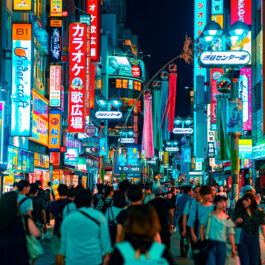


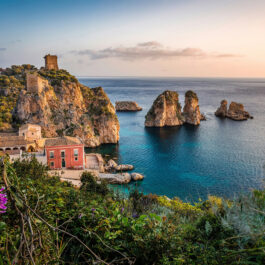


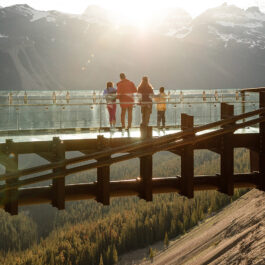
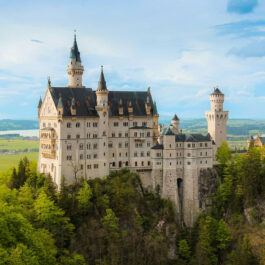

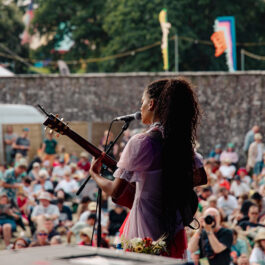
Sorry, the comment form is closed at this time.